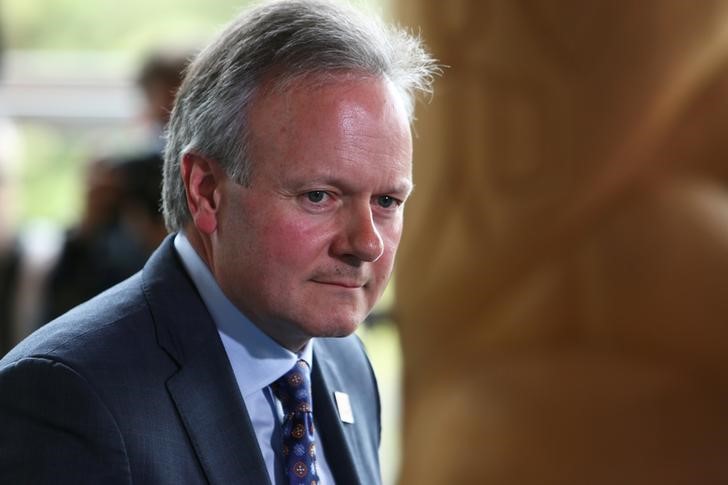 © Reuters. Governor of the Bank of Canada Stephen Poloz speaks to delegates during the G7 Finance Ministers and Central Bank Governors meeting in Whistler
© Reuters. Governor of the Bank of Canada Stephen Poloz speaks to delegates during the G7 Finance Ministers and Central Bank Governors meeting in WhistlerVICTORIA, British Columbia (Reuters) – The effects of U.S. steel and aluminum tariffs and tighter mortgage rules will “figure prominently” in the Bank of Canada’s July decision on interest rates, Governor Stephen Poloz said on Wednesday.
In a speech promising increased transparency from the central bank in an age of economic uncertainty, Poloz said there was “a litany of things we simply do not know” these days, which is why the bank is “particularly data-dependent” right now.
With the next rate decision set for July 11, Poloz said the bank was working to incorporate in its projections the effects of U.S. metals tariffs, along with retaliatory measures, as well as trying to understand how recent moves to tighten mortgage lending, dubbed B-20 guidelines, were affecting the housing market.
“We expect these issues to figure prominently in our upcoming deliberations,” Poloz said in a speech to the Greater Victoria Chamber of Commerce. “We cannot mechanically follow the rate path provided by our models because there is simply too much uncertainty in the world.”
The degree to which uncertainty about trade policy was holding back business investment was unclear, as was the economy’s sensitivity to higher interest rates given high household debt levels, Poloz said.
Growing trade tensions between Canada and the United States and the start of tariffs between the two countries have dimmed Canada’s economic outlook since the Bank of Canada on May 30 said higher interest rates would be needed to keep inflation near target.
Poloz said the bank’s move to less cautious language in its May policy statement represented increased confidence that the economy was performing as expected and that higher interest rates would be warranted.
“Financial markets understood our message,” Poloz said.
The hawkish statement in May boosted bets for a July rate hike to a near certainty, but trade disagreements between Canada and the United States and recent soft economic data have cut odds of a rate hike to 50-50 at best.
Poloz reiterated his opposition to providing explicit forward guidance on policy decisions, which the bank ended in 2014, saying forward guidance would not enhance the bank’s credibility but rather put it at risk.
He said policymakers have seen signs that financial markets have become more responsive to data surprises as a result of stopping forward guidance, particularly over the past year.
“In other words, market signaling has become stronger,” he said.
Fusion Media or anyone involved with Fusion Media will not accept any liability for loss or damage as a result of reliance on the information including data, quotes, charts and buy/sell signals contained within this website. Please be fully informed regarding the risks and costs associated with trading the financial markets, it is one of the riskiest investment forms possible.
Source: Investing.com



























